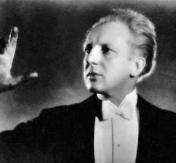
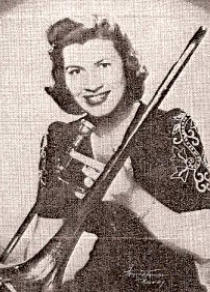
The St. Louis Symphony playing a Pops concert in 1944
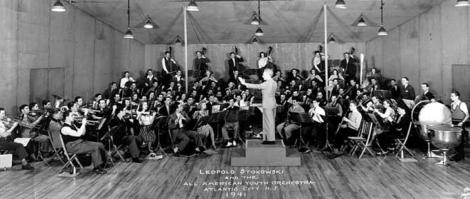
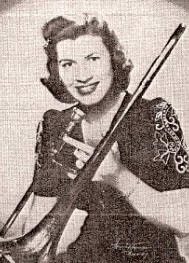
After two weeks of rehearsals, the group embarked on a tour of South America: Rio de Janeiro and Sao Paulo, Brazil;
Buenos Aires, Argentina, and Montevideo, Uruguay. Stokowski, who had previously recorded for RCA Victor, convinced
Columbia Records to finance the tour; in return he agreed to record for Columbia Records. Before their tour, Stokowski
and the 1940 AAYO recorded two sides for Columbia, including The Star Spangled Banner and Irving Berlin's God Bless
America, both arranged by Stokowski. They later recorded other sides for Columbia. [Z2]
In 1943, Dorothy earned a bachelor of music degree with distinction from the Eastman School of Music in Rochester, NY,
with a double major on trombone and piano. [Z1] During the summers of 1941 and 1942, she had the distinction of
playing trombone in the Tanglewood Music Center Orchestra under BSO conductor Serge Koussevitzky. She won her
first professional job as trombonist with the National Symphony Orchestra, in Washington, DC, for the 1943-44 season.
In 1944, Dorothy, then 21, auditioned for and won the principal trombone chair with the St. Louis Symphony,
a position she held for 14 years. [Z1]
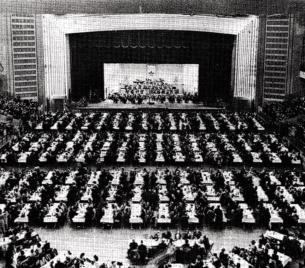
During the early years, ASO musicians were paid $35 every other week, and by 1930, the country was in the midst of
a Depression. To earn a living, Jane traveled across Georgia to play with other orchestras. “The symphony was only
22 weeks out of the year,” she said. “So what do you do the other 30 weeks?” [L2]
For 15 years she played with Theater of the Stars, the only woman in the band. She also played
for opera companies and symphony orchestras, including the Savannah Philharmonic and
orchestras in Georgia, and Chattanooga, Tennessee. And always with a smile!
Her longtime friend Ellie Kosek said, "On our many trips to North Carolina, I would listen to her
stories which were pricelss. Who needed a radio?" [L5]
She invested in real estate, in case her music career didn't pan out. But music was her passion.
Henry Sopkin led the ASO for 21 years. When he stepped down in 1966, Robert Shaw, who had been working with
George Szell in Cleveland, became the ASO music director. Shaw wanted each musician to audition for him.
Jane quickly got to work. “I told my family that Christmas would have to be on hold that year. I was practicing seven
or eight hours a day, going through all the literature.” [L3]
She admits to being nervous, but aced the audition. “I never played better in my life!” she said.
Shaw appointed her co-principal of the bass section. The following year, the ASO became a full-time orchestra.
Under Shaw's direction, the ASO gained a fine reputation, attracting impressive soloists and guest conductors, like
Nathan Milstein, Isaac Stern, Igor Stravinsky and Aaron Copland. [L3]
Photo right: Jane with music director Robert Shaw in 1963
One memorable performance featured pianist Arthur Rubinstein playing the Tchaikovsky Piano Concerto. “He plays the
first big chords of the concerto,” Jane said, “and all of a sudden the piano starts rolling toward the edge of the stage.
The people in the first rows were scattering. Everyone was in horror!” Fortunately, the footlights kept the piano from
rolling off the stage. Stage hands secured the piano. Unfazed, Rubinstein carried on. [L3]
In 1948, Warren Little joined the ASO flute section. Jane was engaged
to a naval officer at the time, and spent that summer studying with the
principal bassist of the Chicago Symphony. When she returned, her
engagement ring was gone. She wanted to stay in Atlanta, her hometown,
and play with the ASO. Warren may have had something to do with this.
On their first date Jane and Warren attended a performance by violin soloist
David Oistrakh. It was a match made in heaven. They married in 1953 and
made music together in the ASO until Warren's retirement in 1992. [L3]
Photo above, Jane and her husband Warren in 1955.
DOROTHY ZIEGLER … NEW CAREER GOALS
During her years (1944--1958) playing trombone with the St. Louis Symphony, 14 years as
principal, Dorothy often performed as piano soloist with the St. Louis Symphony, St. Louis
Chamber Orchestra, and the Springfield (Illinois) Symphony. She also taught at the St. Louis
Institute of Music (trombone and piano), Washington University (trombone and vocal coach)
and the University of Southern Illinois (trombone). [Z5]
However, her focus began to shift to opera and conducting. From 1951 -- 1958, she directed the Washington
University Opera Theater. In 1955, she was appointed conductor and artistic director of the St. Louis Grand Opera
Guild, a post she held until 1964. From 1963 -- 1965, she conducted the Kirkwood (IL) Symphony Orchestra. [Z1]
Never one to rest on her laurels, in 1957 Dorothy attended the Julliard Institute for Opera Conductors and won an
American Symphony Orchestra League award in 1961 to study with conductor Max Rudolph. She also studied
conducting privately with Nadia Boulanger, Felix Waldman and Boris Goldovsky. [Z1]
In 1962 Dorothy released an innovative “music minus one” recording, Your Rehearsal Accompanist, which was widely
used by instrumental and vocal soloists. Dorothy's friend, Robert Weatherly, then principal trumpet of the
St. Louis Symphony, produced the recording. Photo below: record jacket back cover
Dorothy and her trombone
During the summer of 1948, she played principal trombone with the Hollywood Bowl Symphony Orchestra.
However, she continued her studies with pianist Earl Wild. [Z5] In 1946, she was awarded a master of music degree
in piano from the University of Southern California.
In 1947, she earned a performance certificate in piano from the American Conservatory, France, where she studied
with famed pianists Robert and Gaby Casadesus. [photo below] This led to a turning point in her career. [Z1]
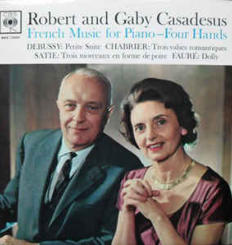
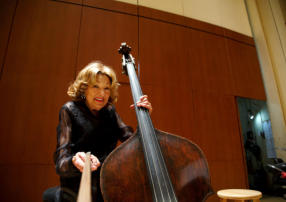
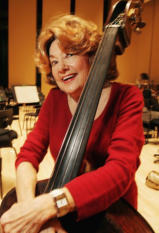
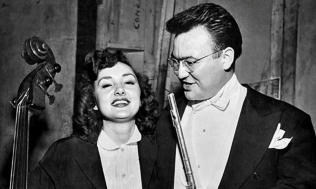
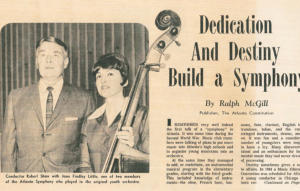
In 1970, Dorothy traveled to Moscow as piano accompanist for three opera singers
in the Tchaikovsky International Competition. After she returned, she was interviewed
for a newspaper article and lamented the lack of an American organization to screen
young performers.
“The young Russians are screened and re-screened before they ever go before those
judges. Here, entrants only have to obtain two letters of recommendation from their
school and they're in.” Her three contestants won no prizes, but one signed a contract
with the Berlin Opera and another has won consistently good reviews.
The only American to win a vocal prize came in sixth in the women’s division.
With considerable amazement, Dorothy said, “Sixth is considered a high prize over
there!” [Z6]
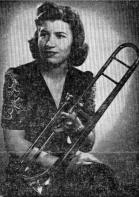
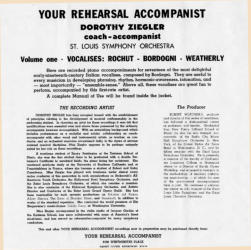
In 1964, Dorothy joined the faculty at Indiana University in Bloomington, Indiana, as vocal and opera coach.
For the 1965-66 season of the Metropolitan Opera National Company, she was vocal coach and assistant
music director for two productions. In 1967 she was the assistant conductor for the Lake George Opera
Festival. [Z1]
In 1966, she accepted a faculty position at the University of Miami in Florida. From 1966 to 1971, she
directed the University of Miami Opera Theater. During that time she played trombone in the University of
Miami faculty brass quintet, and principal trombone with the Fort Lauderdale Symphony, Greater Miami
Opera Guild and the Miami Beach Symphony. [Z5]
Her piano performances continued. A reviewer said of one concert, “She must be complimented both as an
accompanist and as a soloist. She was very much the star, approaching the piano with decisiveness and
complete involvement.” [Z4]
Two years later she made another career move …
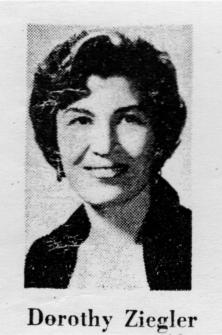
A NOTABLE CAREER CUT SHORT
From 1970-1971, her teaching activities at the University of Miami included private trombone students, coaching the
trombone choir, private voice students, and opera workshop. [Z5] Sadly, her brilliant career was cut short when she
was diagnosed with cancer. On March 1, 1972, Dorothy Ziegler died at the age of forty-nine.
Survivors included her parents and her brother, Fred Ziegler, who said of his sister, whom he greatly admired,
"She never married. Her true love and life was music!” [Z7]
Her University of Miami colleague, tubist Constance Weldon said: “Dorothy was a respected colleague and dear friend …
the most multi-talented person I have ever known.” [Z8]
Doris Reno, the Miami Herald music editor, said: “Miss Ziegler may be one of the most versatile musicians
[Miami University] ever put under contract. [Z4]
The Atlanta Symphony Orchestra continued to gain international renown.
Jane acquired a new bass, crafted by Italian master Carlo Giuseppe Testore.
Although the magnificent instrument stood 6 feet high and weighed 30
pounds, it could not hide Jane's sartorial flair.
Photo at right, Jane in the ASO bass section
Her fellow ASO bassist, Michael Kurth, joked that Jane would “rather sacrifice
all the varnish on the back of her bass than wear jeans without rhinestones.”
The ASO manager once asked Jane, then in her 70s, to go home and change
after she arrived to play a concert in a blouse he considered too revealing. [L1]
Yoel Levi became music director in 1988, followed by Robert Spano, who took over in 2000. In 2002, Jane's husband,
Warren Little, died. By then, Jane had endured several injuries, including a broken shoulder, elbow and pelvis, and a
cracked vertebra after a fall. Such injuries might have discouraged another musician. Not Jane.
Music was her passion, and now she had another goal. Breaking the record for professional longevity. Her closest rival
was Frances Darger, who had played violin with the Utah Symphony for 70 years and retired in 2012 at the age of 87.
“I'd thumb through the Guinness book and say, wouldn't it be neat?” Jane said. “A lot of people do crazy things like
sitting on a flagpole for three days. I just kept on. It was just me and the lady in Utah.
So finally I said, “I'm going to do this.” [L2]
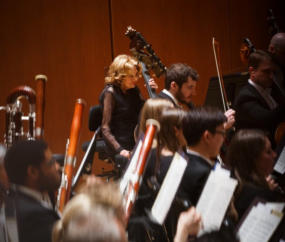
And break it she did, during a performance on February 1, 2016. [L2]
The audience gave her a five-minute standing ovation.
At right, Jane and her bass after the concert
Of her achievement, Timothy Cobb, principal bassist of the New York
Philharmonic, said, “It's just mind-boggling. It takes a tremendous amount
of physical power, frankly, just brute force to play in a big orchestra. I have
had friends who've made it into their 70s but [for Jane to be] pumping it out in the orchestra is really something.” [L4]
Musing over her life in 2015, Jane said, “Suppose I had been absent the day we took that music test?
I probably wouldn't have this career. I must say I've had a charmed life.” [L3]
In a Facebook post, the ASO spokesperson said, “We can say that Jane was fortunate to do what she loved
until the very end of her storied life and career. The Atlanta Symphony Orchestra was truly blessed to have
Jane as part of our family for the past 71 years and we all miss her passion, vitaity, spirit and incredible
talent.” [L4]
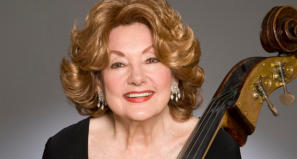
Although she was receiving chemotherapy treatments for cancer,
Jane continued playing concerts. But on May 1, 2016, she collapsed
on stage while playing “There's No Business Like Show Business.”
Rushed to the hospital, she died the following day at the age of 87.
Tributes poured in, including an extended obituary in the
New York Times. [L1]
© copyright 2017 Susan Fleet
“Her footprints are permanently etched on that stage,” said one concert-goer. “Everyone who ever attended
a concert was amazed to see this tiny woman with that huge instrument!”
Bassist Michael Kurth, who was playing next to Jane when she collapsed, said, “She was unstoppable. She
outlasted every era of this orchestra. The next, most longest tenured member was here twenty years less
than she was. There are no words to describe how remarkable she was. You think of superlatives and you
just run out.” [L4]
The ASO associate principal viola, Paul Murphy, may have summed it up best. “Hollywood could not have
scripted it better. For her to go out at the end of a concert, the golden age of Broadway, during an encore
that included the words “let's go on with the show.” [L4]
COMMENTARY
ROLE MODELS: Dorothy's parents were talented musicians who encouraged her musical development from
a very young age. Jane's mother was a pianist, who fostered her love of music. Jane was fortunate to attend
a school where music was encouraged, and the music director was responsible for putting a string bass into
her hands. Although Jane never received a college degree, she studied with several prominent bass players,
including the principal bass of the Chicago Symphony Orchestra. Dorothy acquired several music degrees,
and studied privately with prominent pianists and conductors.
OBSTACLES: Both Jane and Dorothy played instruments not then considered suitable for women, in Jane's case the
bass, in Dorothy's the trombone. However, their obvious ability to play their instrument apparently overcame any
criticism. Neither Jane nor Dorothy spoke about encountering any gender bias. If they did, they didn't tell anyone,
at least not for publication.
MENTORS in Dorothy's case, her parents, Leopold Stowkowski, and many of her private teachers.
In Jane's case, her parents, early music teachers, her husband, Warren Little, and conductor/music director
Robert Shaw, who recognized her extraordinary talent.
LEGACY: Due to her many achievements, Dorothy remains an inspiration to female trombonists and conductors.
Jane will live on in the memories of her ASO colleagues and other prominient musicians as an outstanding bassist,
along with anyone who witnessed her remarkable tenacity in breaking the Guinness World Record for professional
longevity with a single orchestra.
TWO TALENTED MUSICIANS
SOURCES: JANE LITTLE
L1 "Jane Little, Atlanta's Venerable Bassist, Dies at 87," Margalit Fox, NY Times 5-21-2016
L2 "With 71 Seasons At ASO, Bassist Jane Little Beats World Record," Gabbie Watts, 2-3-2016
http://news.wabe.org
L3 "Jane Little Traces the Steps of Her 70-Year Career," 8-1-2015, Journal of the American Federation of
Musicians
L4 "An amazing way to go," Geoff Edgers and Fred Barbash, Washington Post, 5-1-2016
L5 "Atlanta Symphony remembers Jane Little," WXIA, 2017, http://www.11alive.com
History sources: dMarie Time Capsule, Saturday, February 2, 1929
Time Life, This Fabulous Century, 1920-1930
SOURCES: DOROTHY ZIEGLER
Z1 Dorothy Miriam Zielger (1922-1972, Susan Fleet, page 1543, Scribners American Biography
Z2 "Miss Ziegler -- Musician," Doris Reno, 11-12-1967, Miami Herald
Z3 "All-American Youth Orchestras Created by Leopold Stokowski in 1940 and 1941"
http://www.stokowski.org/All-American_Youth_Orchestra.htm
Z4 University of Miami News Bureau release, 3-2-72, Author collection
Z5 Resume: Dorothy Ziegler, University of Miami, March 1971, Author collection
Z6 "Screening Is the Answer, Says Pianist," Doris Reno, 8-9-1970, Miami Herald
Z7 Fred Ziegler, letter to author, 4-13-1996
Z8 Constance Weldon, note to author, 2-29-1996
History sources: dMarie Time Capsule, Thursday, July 20, 1922
Jane Little (1929 - 2016)
Orchestral bassist
Longest-tenured musician
to play with one orchestra
71 years with the Atlanta
Symphony (1945--2016)
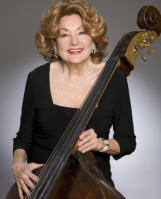
For more than 7 decades, Jane Little played double bass with the Atlanta Symphony Orchestra. As fate would have it, she died doing
what she loved to do. In 2016, she collapsed during an ASO Pops concert while playing “There's No Business Like Show Business.”
Then 87 years old, she had played with the ASO without interruption since 1945, the longest-serving musician in the world to play
with a single orchestra. [L1]
Jane Findley was born in Atlanta on February 2, 1929, scant months before the stock market crash that sent America and the rest
of the world into a financial Depression. Her mother, a talented pianist, served as accompanist for a dancing school run by one of
Jane's aunts. “I wanted to be a ballerina,” Jane later said, “but you need to have these nice feet, and mine just weren't right.” [L1]
She wanted to play piano, but her family struggled during the Depression. “We had no piano. I would go to the neighbors' house and
use theirs. I picked out tunes and taught myself to play a little bit.” [L3] In high school, she took a musical aptitude test. Her score
was off the chart. The music director asked her to play in the orchestra. Jane wanted to play clarinet, but the all-girl school had no
bass player, so she wound up with a double bass. A month later she was hooked.
A diminutive girl who stood five feet tall and weighed only 90 pounds, Jane said, “It was difficult to push those heavy strings down,
and carry the instrument around, but I just loved it.” [L1] In 1945 she became a charter member of the Atlanta Youth Symphony.
Two days after her 16th birthday, she played her first concert with them on February 4, 1945. Back then, the city had no adult
orchestra, but professional musicians joined the talented youth group. In 1947 it was renamed the Atlanta Symphony Orchestra. [L1]
While studying at the University of Georgia (now Georgia State University) Jane continued playing with the ASO. Atlanta had no concert
hall so the ASO played concerts in a local theater which was also a venue for ice shows, wrestling and the circus. “We'd come in for a
Saturday morning rehearsal, and they'd be taking down the wrestling ring, and picking up beer bottles.” One Saturday she heard
ominous roars. The circus had performed there the previous night and had not yet picked up the cages for the lions and tigers. [L1]
Back then, Jane had no idea that she was destined to become the ASO's longest-playing member.
Dorothy Ziegler
1922 -- 1972
So many wonderful instruments ... why play only one?
Unlike Jane, who remained devoted to the double bass, Dorothy played many instruments.
Seven years older than Jane, Dorothywas born July 20, 1922, in Muscatine, Iowa. Both her
parents were musicians. Elmer Ziegler was a bandmaster, composer and music store owner.
Wilma (Busch) Ziegler played piano, clarinet and oboe, and gave music lessons. Dorothy's
younger brother, Frederic, played tuba and drums with the local concert band and later
while serving in the US Navy. [Z1]
Dorothy began violin lessons at the age of two, but even before that she loved playing the
triangle in her father's concert band. “I can't remember any time when I wasn't playing
something,” she said in a 1967 interview. “I started trombone at seven, played French horn a
year or two, and bassoon and baritone.”
She also studied violin and piano seriously, but gave up the violin. “My teacher said it was very rare for anybody to achieve
equally good techniques on two instruments, so I had to choose.” [Z2]
As a teenager Dorothy excelled at trombone and piano, winning top honors at state and national competitions.
In 1940 famed conductor Leopold Stokowski [photo at right ] auditioned more than 1000 young
musicians and selected 90 of them to play in his All-America Youth Orchestra (AAYO). Dorothy
was chosen to play trombone. [Z3]
Photo below: The first AAYO rehearsal in Atlantic City NJ, July 1940.

Dorothy Ziegler (1922 -- 1972)
Trombonist, pianist, vocal coach,
conductor, and music educator
Principal trombone: St. Louis
Symphony (1944--1958)
Director and conductor: St. Louis
Grand Opera, 1955- 1964
JANE (FINDLEY) LITTLE
Devoted to the Double Bass

WELCOME TO SUSAN FLEET’S WEBSITE
AUTHOR, TRUMPETER, MUSIC HISTORIAN

Copyright Susan Fleet 2007 All rights reserved None of the materials on this website may be reproduced or
transmitted by any means, including photocopying, recording or the use of any retrieval system without
permission. For permission, email Susan via the contact page
In 1947, the St. Louis Grand Opera Guild hired Dorothy to be their accompanist. Thereafter, in addition to her
performances on trombone and piano, Dorothy's resume would include vocal coach and conductor. [Z5]
JANE LITTLE and the ASO: The Early Years
JANE LITTLE … Chasing the record











